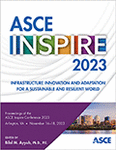Strategic Planning, Coordination, and RD&D Priorities for National At-Scale CO2 Transport Infrastructure
Publication: ASCE Inspire 2023
ABSTRACT
The Biden–Harris Administration’s decarbonization targets require strategic planning, coordination, and accelerated development of a nation-wide CO2 transport infrastructure to support carbon capture, utilization, and storage (CCUS) and carbon dioxide removal (CDR) projects. Under the Infrastructure Investment and Jobs Act, Pub. L 117-58 (November 15, 2021), also known as the Bipartisan Infrastructure Law (BIL), and the Inflation Reduction Act, Pub. L 117-169 (August 16, 2022), the US Department of Energy (DOE) Office of Fossil Energy and Carbon Management (FECM) is supporting the development of multi-modal CO2 transport options that consider societal impact and community engagement needs. To date, DOE FECM-sponsored workshops have identified CO2 transportation research areas and recommendations related to CO2 Freight Transport, New and Existing Infrastructure, and a Roadmap for CO2 Transport Applied Research. Activities under the BIL include front-end engineering and design studies for CO2 transport infrastructure, infrastructure deployment, and repurposing through the Carbon Dioxide Transportation Infrastructure Finance and Innovation Program, and investment in upsizing future infrastructure through the Future Growth Grants program. Capturing and leveraging lessons learned from CCUS projects and interagency and international collaboration efforts is desired to efficiently implement a nation-wide CO2 transport infrastructure.
Get full access to this article
View all available purchase options and get full access to this chapter.
REFERENCES
Abramson, E., McFarlane, D., and Brown, J. (2020, June). Transport Infrastructure for Carbon Capture and Storage. Retrieved from https://www.betterenergy.org/wp-content/uploads/2020/08/GPI_RegionalCO2Whitepaper.pdf.
ACT. (2023). ACT - Accelerating CCS Technologies. Retrieved from http://www.act-ccs.eu/.
CEM. (2023). Carbon Capture Utilization and Storage. (Clean Energy Ministerial) Retrieved from https://www.cleanenergyministerial.org/initiatives-campaigns/carbon-capture-utilization-and-storage/.
CETP. (2023). The Clean Energy Transition Partnership. Retrieved from https://cetpartnership.eu/.
Chen, B. (August 15-19, 2022). SimCCS3.0: An Open-source Toolset for Regional CCS Infrastructure Decision Support. Carbon Management Project Review Meeting. Pittsburgh, PA.
CSLF. (2023). Carbon Sequestration Leadership Forum. (Carbon Sequestration Leadership Forum) Retrieved from https://www.cslforum.org/.
DOE FECM. (2022, February 23-24). Carbon Transport and Storage R&D Priorities for Repurposing Infrastructure. Retrieved from https://www.energy.gov/sites/default/files/2022-11/%5BWORKSHOP%5D-Carbon-Transport-and-Storage-R%26D-Priorities-for-Repurposing-Infrastructure.pdf.
DOE FECM. (2022, April). Strategic Vision: The Role of Fossil Energy and Carbon Management in Achieving Net-Zero Greenhouse Gas Emissions. Retrieved from https://www.energy.gov/sites/default/files/2022-04/2022-Strategic-Vision-The-Role-of-Fossil-Energy-and-Carbon-Management-in-Achieving-Net-Zero-Greenhouse-Gas-Emissions_Updated-4.28.22.pdf.
DOE FECM. (2023, February 21-23). Roadmap for CO2 Transport Fundamental Research Workshop. (US Department of Energy Office of Fossil Energy and Carbon Management) Retrieved from https://web.cvent.com/event/2d60ec9a-c07c-4fe4-88f1-a37ca7db44c8/summary.
DOT. (2016, January 12). The FAST Act: Freight Provisions. Retrieved from https://www.transportation.gov/fastact/freight-factsheet.
EFI. (2020, October). An Action Plan for Carbon Capture and Storage in California: Opportunities, Challenges, and Solutions. Retrieved from https://sccs.stanford.edu/sites/g/files/sbiybj17761/files/media/file/EFI-Stanford-CA-CCS-SFPM-rev2-12.11.20.pdf.
Ellett, K., Middleton, R., Stauffer, P., and Rupp, J. (2017, July 1). Facilitating CCS business planning by extending the functionality of the SimCCS integrated system model. Energy Procedia, 114, pp. 6526–6535.
Eni. (2023). The HyNet North West project. Retrieved from https://www.eni.com/en-IT/operations/united-kingdom-hynet-north-west.html.
GCCSI. (2022, July). Understanding CCS: Transport. Retrieved from Global CCS Institute: https://www.globalccsinstitute.com/wp-content/uploads/2022/07/Factsheet_CCS-Explained_Transport.pdf.
Holubnyak, E., and Quillinan, S. (2022, October). Overview of Probable Market Regions: State Perspective. Retrieved from https://usea.org/sites/default/files/event-/Holubnyak%20-%20CO2%20Freight%20Transport%20Workshop.pdf.
Larson, E., Greig, C., Jenkins, J., Mayfield, E., Pascale, A., Zhang, C., and Socolow, R. (2020, December 15). Net-Zero America: Potential Pathways, Infrastructure, and Impacts. Retrieved from https://netzeroamerica.princeton.edu/img/Princeton_NZA_Interim_Report_15_Dec_2020_FINAL.pdf.
LEP. (2021, June 20). Building to Net-Zero: A U.S. Policy Blueprint for Gigaton-Scale CO2 Transport and Storage Infrastructure. Retrieved from https://legacy-assets.eenews.net/open_files/assets/2021/06/30/document_ew_10.pdf.
Ma, Z., Chen, B., and Pawar, R. (2023). Phase-based design of CO2 capture, transport, and storage infrastructure via SimCCS 3.0. Scientific Reports, 13, p. 6527.
Mannesmann Line Pipe. (February 2014). Predicting Crack Arrest in Pipelines – Proposal for a Novel Analytical Approach. Retrieved from https://www.mannesmann-linepipe.com/fileadmin/footage/MEDIA/gesellschaften/smlp/Documents/Predicting_Crack_Arrest_in_Pipelines_-Proposal_for_a_Novel_Analytical_Approach.pdf.
Mannucci, G., Demofonti, G., and Di Biagio, M. (2005). X100 - Fracture Initiation and Propagation. Retrieved from https://www.phase-trans.msm.cam.ac.uk/2005/LINK/175.pdf.
MI. (2023). IC3: Carbon Capture. (Mission Innovation) Retrieved from http://mission-innovation.net/our-work/innovation-challenges/carbon-capture/.
Morgan, D., Guinan, A., and Sheriff, A. (2022, March 14). FECM/NETL CO2 Transport Cost Model (2022). (National Energy Technology Laboratory) Retrieved from https://netl.doe.gov/energy-analysis/search?search=CO2TransportCostModel.
NETL. (2015, April 21). A Review of the CO2 Pipeline Infrastructure in the U.S. Retrieved from https://www.energy.gov/sites/prod/files/2015/04/f22/QER%20Analysis%20-%20A%20Review%20of%20the%20CO2%20Pipeline%20Infrastructure%20in%20the%20U.S_0.pdf.
NETL. (2022, December 2). DOE Seeks Information on Regional and National Carbon Dioxide Transport Infrastructure. (National Energy Technology Laboratory) Retrieved from https://netl.doe.gov/node/12226.
NETL. (2023, May 31). NETL Develops Pipeline Route Planning Database to Guide CO2 Transport Decisions. Retrieved from NETL: https://netl.doe.gov/node/12580.
NPC. (2021, March). “Chapter 6: CO2 Transport” in Meeting the Dual Challenge: A Roadmap to Meeting At-Scale Deployment of Carbon Capture, Use, and Storage. Retrieved from https://dualchallenge.npc.org/files/CCUS-Chap_6-030521.pdf.
PHMSA (Pipeline and Hazardous Materials Safety Administration). (2023, April 13). Annual Report Mileage for Hazardous Liquid or Carbon Dioxide Systems. Retrieved from https://www.phmsa.dot.gov/data-and-statistics/pipeline/annual-report-mileage-hazardous-liquid-or-carbon-dioxide-systems.
PHMSA (Pipeline and Hazardous Materials Safety Administration). (2023). Summary of PHMSA’s CO2 Potential Impact Radius R&D Project. Pipeline and Hazardous Materials Safety Administration.
US Census Bureau. (2017). Commodity Flow Survey Data. Retrieved from https://www2.census.gov/programs-surveys/cfs/data/2017/.
USEA (United States Energy Association). (2022, October 12). CO2 Freight Transport Workshop. (United States Energy Association) Retrieved from https://usea.org/event/co2-freight-transport-workshop.
Information & Authors
Information
Published In
History
Published online: Nov 14, 2023
ASCE Technical Topics:
- [Inorganic compounds]
- Business management
- Carbon compounds
- Carbon dioxide
- Carbon fibers
- Chemicals
- Chemistry
- Construction engineering
- Construction management
- Engineering materials (by type)
- Environmental engineering
- Fibers
- Freight transportation
- Infrastructure
- Materials engineering
- Organic compounds
- Practice and Profession
- Project management
- Sustainable development
- Transportation engineering
- Transportation management
- Transportation networks
Authors
Metrics & Citations
Metrics
Citations
Download citation
If you have the appropriate software installed, you can download article citation data to the citation manager of your choice. Simply select your manager software from the list below and click Download.
